- Home
- Aharon Appelfeld
The Man Who Never Stopped Sleeping Page 2
The Man Who Never Stopped Sleeping Read online
Page 2
“Thank God. Some people thought that sleep would be your undoing, but the wiser ones said, ‘Let the boy sleep. He’s bound up in sleep, and we mustn’t detach him. When the time comes, he’ll wake and he’ll be like the rest of us.’”
I looked closely at her and was stunned: she looked like my aunt Elsa. Only her clothes were different. Aunt Elsa always dressed with exaggerated elegance.
“You have to emerge from sleep.” She spoke in motherly tones.
“I hope to do that soon,” I said, but I knew it didn’t depend on me.
“You’re young, and your whole life lies before you,” she said. That was a sentence I’d heard more than once from my aunt. It was one of her clichés. Everybody knew she had no words of her own, that clichés were her crutches, and they secretly made fun of her.
“You have to get away from us,” the woman continued. “Our life has no purpose or meaning. The sooner you leave us, the better for you.”
“Where should I go?”
“Anywhere, just not here.”
“But—how can I say it—I belong to you. I was with you in the ghetto and in the forest, and you brought me here. Your language is mine, and in every corner I see a relative. You, for example, look very much like my aunt Elsa. I almost called you Elsa.”
“Why didn’t you?”
“I wasn’t sure.”
“Dwelling with us won’t do you any good.” She repeated her argument. “A boy like you must finish high school and not get involved in smuggling, in money changing, and in all sorts of dubious businesses.” It was as though her voice came from elsewhere.
“You’re right,” I said.
Suddenly, I felt myself being swaddled by sleep. I stood up and said, “Sorry. I have to go. I have to go back to my place.”
“Where is your place?” she asked matter-of-factly.
“Not far from here,” I said, and I ran to my bent metal sheet. Sleep grabbed me, and I slumbered.
4
Every day I became more alert. The food was plentiful, the milk was fresh and tasty, and I gobbled down whatever came to hand.
“He’s awake. He’s come out of his sleep,” a refugee said, pointing at me. I didn’t know whether he was happy for me or happy to make fun of me. My exposed wakefulness wasn’t easy for me. In sleep I was connected, with no barrier, to my parents and to the house where I grew up, and I continued to live my life and theirs. Now I felt that I had been expelled from a protected place into blinding, wounding light.
At night I no longer slept as before. Sounds penetrated me and tore up my sleep, and I was sorry to be cut off from what was a part of me.
As I was being struck by the light, I saw a man, not tall, dressed in a short peasant blouse, talking to the older boys. He looked like our pharmacist, who used to give a lollipop to every child who entered the pharmacy. But this man’s temperament was different. He spoke in torrents of Yiddish mixed with German about another life, a life with much activity and pleasure. I was reminded of my uncle Arthur, who also spoke about another life. Father would listen and make occasional comments. Mother accepted his words without challenge. Arthur was her beloved big brother, and she admired everything he said.
I looked at the boys gathered around the man. They drank in his words thirstily. Some of them were tall and others were short, some alert and others bleary-eyed. For a moment it seemed that they, too, had been roused from deep sleep a short time ago.
“And how will we do it?” asked one of the boys.
“I’ll explain,” said the man calmly. “We’ll start off the morning with a run, we’ll eat breakfast, then we’ll study Hebrew by speaking it, and later in the day we’ll exercise and swim. We have two boats at our disposal, and we’ll learn to row.”
“And what will happen to us?” asked another boy.
“You’ll change. In three months you’ll be different. People won’t recognize you. You’ll be tall, strong, and tanned. The language will join with the body and become one.”
I didn’t understand everything he said, but I understood that if we did everything we were supposed to, we’d change and become different. In the process a part of me would be taken away, and I’d grow differently.
There was a frightening charm in his voice.
“My name is Ephraim. Call me Ephraim. We’ll meet tomorrow after breakfast.”
I went back to my metal sheet and tried to fall asleep. Ephraim’s words, which enchanted me at first, now seemed like a recruitment speech for a unit where you trained night and day. The leaves were few and short, your only concern was obeying orders, and anyone who didn’t obey them properly was punished.
I decided not to enlist and felt relieved.
I fell asleep and dreamed that I had gone home. Father was sitting in his room, writing. Mother was in the kitchen. The afternoon silence that I loved so much filled the rooms, but I was surprised my parents didn’t notice that I’d returned. I decided not to approach them but to wait for the right time.
Later I heard Mother say, “Michael, lunch is on the table.”
“I’m coming.” Father’s voice came promptly.
Father kept on writing, but after a minute or two he rose to his feet, closed his notebook, and went into the dining room.
“Vegetable soup!” Father called out from the doorway. “Just what I wanted.”
“It tastes good, I think,” said Mother softly.
“I’m sure.”
That simple conversation, familiar to me in the marrow of my bones, brought tears to my eyes: they had gotten used to living without me.
5
After breakfast I saw the older boys gathered around Ephraim. I joined them, and we went to the seashore. The sea was already blazing.
“We’ll make our own camp.” Ephraim spoke without raising his voice. “We’ll be separate from the refugees.” I understood right away that he wasn’t pleased with the refugees and that he wanted to keep us from them. I also noticed that he said “we.”
Then we sat on the beach, and Ephraim spoke. He told us that we would train ourselves to be pioneers, going ahead of the camp and devoting ourselves to the general good, not like the refugees, who were concerned only with themselves.
I saw Mark, and I was glad he was there. Mark was wearing clothes that fit him, and his eyes glowed with maturity. I wanted to know whether Ephraim’s words sounded right to him.
“We’ll live and we’ll learn,” he declared. I had no opinion of my own, and so I agreed with him.
Then a wagon full of tents, field cots, and blankets arrived, and Ephraim showed us how to put up a tent. They were square tents, for two, and Mark asked me to put one up with him.
That’s how our new life began. Wakefulness grew stronger in me with every hour. The sleepiness that had enveloped me for all those weeks diminished, and the dark cover that had protected me was torn away. Soon I would be bare.
Mark’s experience in the war appeared to have been different from mine. He did everything coldly and methodically. I observed him and said to myself, Those are the motions I’ll have after Ephraim trains me. Ephraim didn’t rush us. He showed us how to stretch the tent cloths and pound the pegs into the sand.
By afternoon seven tents were standing. Ephraim checked the ropes and pegs and declared our tent stable. The look of the tent, the two field cots in it, and the blankets gave me the feeling that I had a protected space and that at night no one would push me anymore.
Later that afternoon we went out for our first run. We were to circle the camp twice. Not everyone managed to do it. Ephraim didn’t give in to the laggards. In the end, they also did what they were supposed to.
At night we lit a bonfire, and Ephraim taught us the first verse of a Zionist song. We were fourteen boys, dressed in khaki shorts that the Jewish Agency had distributed. We sang and we roasted potatoes.
I felt that the road to robustness would be long. I would have to train in the spirit of Ephraim’s words, to grow flexible and suntanned, to uproot the fears
within me, and to peel off the remaining slumber that still clung to me.
That night, as though in spite, the overpowering slumber returned, and it seemed it was going to bear me away on its waves. I said to myself, Ephraim wouldn’t be pleased with my relapse, and I tried to shake off the darkness that had gripped me. But it was stronger than I was, and it wasn’t rooted out of me until the morning wake-up bell.
In my sleep the next night, Uncle Arthur was leaning over me, asking how I was, and telling me that Ephraim’s path was not the path to faith in mankind. I must understand that the body wouldn’t save us, only the spirit. “Muscle Judaism” was a twisted idea.
I was surprised at my mild uncle Arthur’s scolding.
“Anyone who wants the Jews to be muscular is living in a world of injustice,” he shouted at me, without minding his manners. “The Jews also belong to the family of man, and the man comes before the Jew.”
Suddenly, a tall, hairy man appeared and forcefully pulled my uncle away while hissing, “Communist!” Uncle Arthur was stunned by the man’s violence and didn’t say a word. Evidently, the tall, hairy man had no other words, just “communist,” which he repeated endlessly. Uncle Arthur, who had been sensitive to noise for as long as I knew him, covered his ears with the palms of his hands. The huge man, seeing what my uncle was doing, burst into loud laughter, a triumphant laugh that shocked me. I awakened and sat up, while everyone else still slept.
6
Our activities were extensive and well planned. Sometimes the training program seemed to be intended to change us completely, so that in time people would say, “They were trained by Ephraim.” Ephraim’s height and manner of speaking were unimpressive. Sometimes he seemed like an ordinary army man to me, training his recruits with a wise hand. He didn’t shout, and he didn’t harass. Though he spoke little, his gaze was determined. At night, on the other hand, at the campfire, he was relaxed, singing and rousing us to sing.
After morning lineup, we would go out for a run. “Alef is ohel, ohel is ‘tent,’” we shouted. “Beit is bayit, bayit is ‘house’; gimel is gag, gag is ‘roof’; dalet is delet, delet is ‘door’; heh is har, har is ‘mountain.’” Every morning we added new words. The words I learned on that seashore were linked to the sea in my mind. Every time I said ohel, I saw the sides of the tent I pitched with my friend Mark and the pegs that refused to be gripped by the sand. The sea was so intense that every new word was filled with its blue water and tempered in the burning light of the sun.
One evening Ephraim spoke again about the need to attach the language to our bodies. Every Hebrew word added strength. I didn’t understand how words became connected to the body, but Ephraim’s words seemed like correct instructions. If we listened to them, we would grow properly, and our thinking would be orderly and clear.
Slowly, imperceptibly, we distanced ourselves from everything that had been in us: the ghetto, the hiding places, the forests. From the southern coast of Naples, they seemed distant and blurry, as if they had lost their dreadful immediacy.
At night, after the ritual singing, we would flop onto our camp beds and fall asleep. It was a different kind of sleep, the kind I had known only from my childhood at home.
—
My mother was talking to me in a language whose notes, accents, and silences I knew. Her voice flowed to me clearly, but for some reason it was hard for me to answer her. As always, my mother understood me and was certain that it was only from “excitement,” a word I hadn’t heard for a while and which pleased me.
After a long silence, she asked, “What’s the matter, dear?”
I tried to stitch together everything that had happened to me in the years since I last saw her, but I was able to come up with only one word.
“Mother.”
That single word made her so happy that she ignored my difficulty in speaking, and her face filled with joy.
Later I managed to tell her, “I have a new language.”
She looked at me in surprise and then grew gloomy.
“A new language,” she repeated.
It was the language of the sea, I added. You learned at the seashore, and you absorbed it with all the colors and smells of the sea.
“Why do you need a sea language?” she wondered, wide-eyed.
“I’m a member of the Chosen,” I said. I was surprised to hear that sentence leave my mouth.
“Won’t you cultivate your mother tongue anymore?”
“Mother,” I said, “don’t worry. What you read to me every night from the storybook Legends of the North, before I went to sleep, that will last forever. I drank in that language from you, and it is in the marrow of my bones.”
Mother was not convinced by my declaration.
“Why is it hard for you to speak to me?” she asked.
The language of the sea is a strong language, but the mother tongue is stronger, it occurred to me to tell her, but in my heart I wasn’t convinced.
“What I had to give you, my dear, I gave with all my heart,” Mother said in a choked voice. “Maybe I was mistaken. I was a young, inexperienced woman then. But don’t doubt my good intentions. Please, son, don’t transfer the secret of our conversation into a language I don’t understand,” she added and then disappeared. I woke up immediately.
7
The days passed without our noticing. Physical training and language instruction kneaded us. Ephraim was vigilant. At night he warned us against the refugees, their talk and their business dealings. We had to grow up without their influence, and only when we were immunized would we be allowed to help them. For the present, we had to invest all our might into shaping our new lives.
Ephraim was a man of many faces: When he ran with us, exercised, and taught us self-defense, he was cheerful and jocular and seemed like a man of thirty. But at night his face would change. He looked like a person with a heavy responsibility weighing on his shoulders. He stopped saying “I” and spoke as “we.”
Some distance from our tent area the refugees lived in gloom. On our morning run or upon returning from field training, we passed by their sheds and heard our mother tongue being mumbled in their mouths. They were still living in the ghettos and the camps, trading goods for other goods, coins for coins. The smell of their food wafted over from their sheds, reminding us, as though in spite, of home.
Whenever I had a little time, I would sneak over to the refugees and sit by the kiosk. I had the feeling that before too long they would pick me up and carry me off. Sometimes a refugee noticed me and called out, “Here’s the sleepy guy,” as though I was about to run away. Anyway, they hadn’t forgotten me.
It’s amazing what the exercise and daily runs did for us. We grew taller. Our skin became tanned, and some of us were already looking at the refugees with arrogance, calling them rootless, as if they were inferior beings, stubborn people who refused to change, who burrowed into their prolonged misery and spoke in a language all of whose words were sorrow, depression, pain that could not be healed, or the unpleasant laughter of someone who was glad to have survived.
Ephraim told us that in the Land of Israel we would be far from them, in the heart of fields, orange groves, and orchards. We would have other names, and our bodies would move in a quiet and measured way, like tillers of the soil, without haste or panic.
The refugees sprawling in their sheds were not indifferent to us. They observed our changes, and not without pride. From time to time we would notice, in the distance, a bald head looking at us in amazement, a woman’s look of desire, a skeptical old man who had seen efforts at change in his lifetime and no longer believed in them.
One evening a refugee approached me, a man of average height, wearing a secondhand suede jacket and a cap. He was a merchant or a money changer, and he asked me for my name and my family’s name.
I told him.
He didn’t ask anything else. He just looked gloomier and gloomier. I knew that for a moment he had taken me for one of his relatives, but disappoint
ment hadn’t been slow in coming.
“Where are you from, sir?” I addressed him, trying to bring him closer.
“It doesn’t matter.”
“Why not?”
“I don’t like talking about myself,” he said, and turned away.
He shuffled away, and his whole body said, I was wrong this time, too. There’s no hope. I was sorry to have been the cause of his disappointment.
I returned to our area feeling somber. I ran into Mark, who shared my tent, and I told him what had happened to me. He looked at me and then astonished me by saying, “I guess we bear other people inside us, too.”
My friend Mark was handsome, quiet, and introverted, doing all his duties seriously and precisely. He neither questioned nor complained, and he didn’t like it when people asked him anything. We had been living in the same tent for more than two months, and I didn’t know a thing about him. His mother tongue was the same as mine, but we obeyed instructions and spoke only Hebrew. Our conversations were brief and about current matters. Sometimes it seemed to me that Mark did things only because he had to. He had a world of his own, his fortress. No one knew where its entrances where, and there he lived his real life. Once, one of the boys challenged him.
“You aren’t here,” the boy said. “Where are you?”
Mark didn’t reply. He just hit him. The boy fell to the ground and shouted, “He’s crazy! What did I do to him?” Mark kept hitting the boy until he was pulled away. That night Ephraim asked Mark why he had hit his comrade. Mark made a strange gesture with his right shoulder and said, “He annoyed me.” He responded to the rest of Ephraim’s questions with only movements of his body.
Ephraim concluded by saying, “Promise all of us that from now on you won’t hit your comrades. If you have a complaint, bring it before this assembly.” Mark responded with silence to this comment as well, but Ephraim insisted that he say “I promise.” After a short delay, Mark did utter those two words.

 Long Summer Nights
Long Summer Nights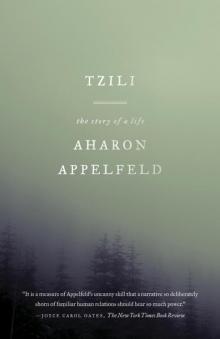 Tzili
Tzili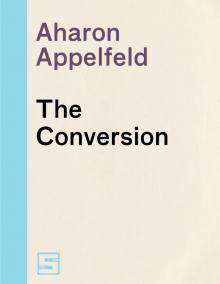 The Conversion
The Conversion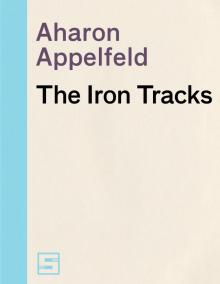 The Iron Tracks
The Iron Tracks All Whom I Have Loved
All Whom I Have Loved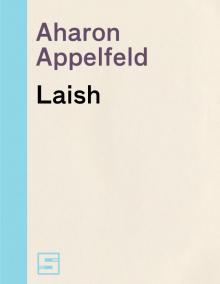 Laish
Laish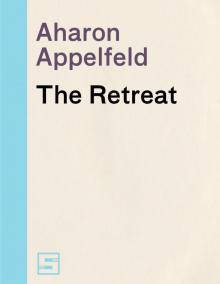 The Retreat
The Retreat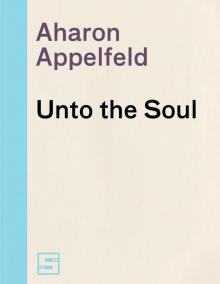 Unto the Soul
Unto the Soul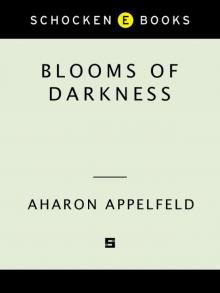 Blooms of Darkness
Blooms of Darkness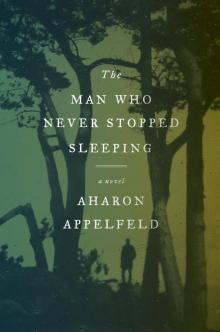 The Man Who Never Stopped Sleeping
The Man Who Never Stopped Sleeping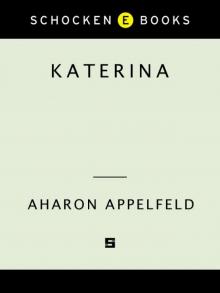 Katerina
Katerina Until the Dawn's Light
Until the Dawn's Light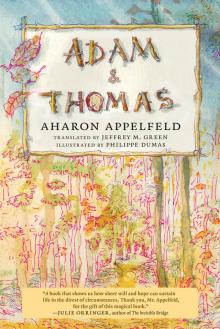 Adam and Thomas
Adam and Thomas Suddenly, Love
Suddenly, Love